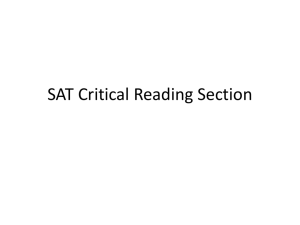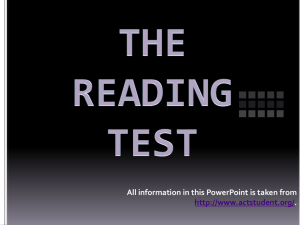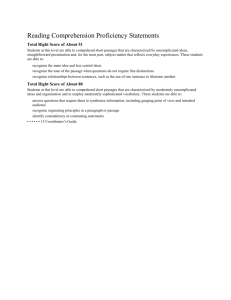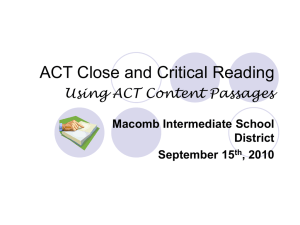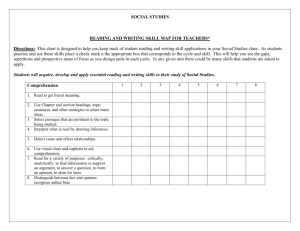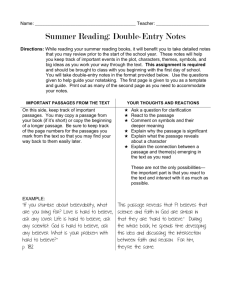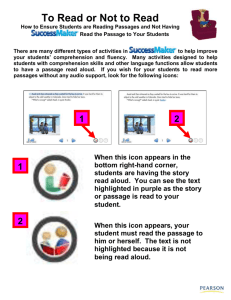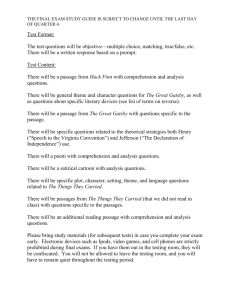ACT Reading Test Preparation
advertisement
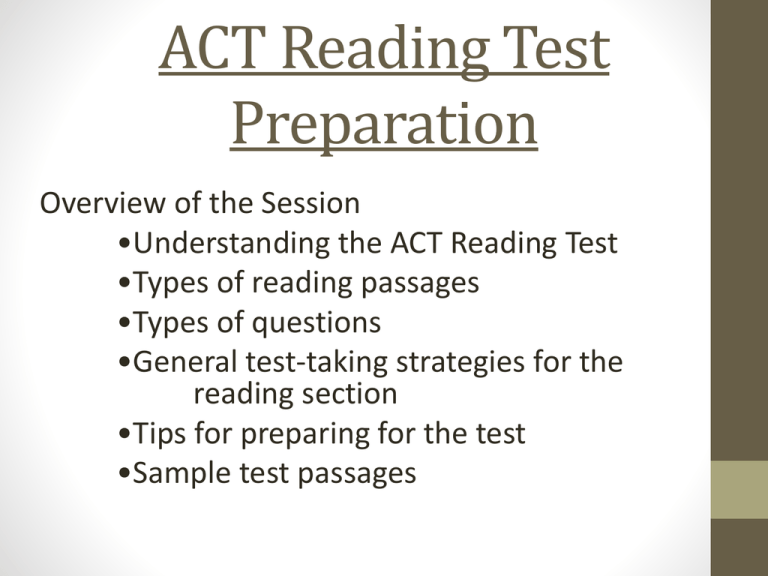
ACT Reading Test Preparation Overview of the Session •Understanding the ACT Reading Test •Types of reading passages •Types of questions •General test-taking strategies for the reading section •Tips for preparing for the test •Sample test passages Understanding the Reading Test • A total of 40 questions in 35 minutes • 4 passages, each with 10 questions • Scoring –1 test score for Reading –2 sub-scores for Literature/Humanities reading skills and Social Sciences/Sciences reading skills Types of Passages •The following types of passages, each with 10 questions, are presented in this order: •Prose Fiction •Social Sciences •Humanities •Natural Sciences •Some types of questions will show up in every type of passage. Others will be unique to specific types. General Information about Passages •Each passage is about 750 words •Each passage is placed into two columns with line numbers in the margin •Each passage uses the same instructions. Instructions never change. Therefore, save time by reading and understanding the instructions before taking the exam. Each passage is accompanied by a set of multiple-choice test questions. These questions do not test the rote recall of facts from outside the passage, isolated vocabulary items, or rules of formal logic. Instead, the test focuses on the complementary and supportive skills that readers must use in studying written materials across a range of subject areas. Prose Fiction Passages •Prose fiction is the only fiction on the test •Consists of excerpts from novels or short stories. •Passages usually have a plot (a sequence of actions) and characters –Keep track of the actions –Who does what? Where was it done? When was it done? Why was it done? –Keep track of characters –What kinds of conflict do they face? Conflict with another character? Internal (conflict within him/herself?) External (Man vs. Nature)? How does the character change? –Keep track of tone–Who is telling the story? Are they biased? Objective? Be alert for connotative words. Social Science Passages •Expository writing that may focus on a variety of subjects, including anthropology, archaeology, biography, business, economics, education, geography, history, political science, psychology, and sociology. Passages focus on analysis. •Common organizational patterns include cause/effect, chronological, and comparisons, so anticipate these types of questions –Keep track of organizational patterns –Is something being compared? Is information offered in time sequence? Are the causes of something being discussed? Note these patterns. –Note the main idea –If possible underline it. Humanities Passages •Excerpts from memoirs and personal essays and in the content areas of architecture, art, dance, ethics, film, language, literary criticism, music, philosophy, radio, television, and theater. •Passages are expository or descriptive and often focused on appreciation of the arts. –Note the main idea. If possible, underline it. –Note the supporting details. Mark the booklet. –Look for cause/effect relationships. Why is something happening? Who or what is responsible? Natural Science Passages •Scientific writings that focus on concepts, details, generalizations, and theories…based on passages in anatomy, astronomy, biology, botany, chemistry, ecology, geology, medicine, meteorology, microbiology, natural history, physiology, physics, technology, and zoology. •Contain many details, and these details need to be related to larger ideas. •Uses organizational patterns: enumeration, classification, compare/contrast, sequence. –Recognize the organizational pattern. Note the main idea and the supporting details. Types of Questions Questions will ask you to use referring and reasoning skills to: • • • • • • determine main ideas locate and interpret significant details understand sequences of events make comparisons comprehend cause-effect relationships determine the meaning of context-dependent words, phrases, and statements • draw generalizations • analyze the author's or narrator's voice and method www.actstudent.org/testprep/descriptions/readdescript.html Strategies for the Reading Test •Balance your time –35 minutes for 4 passages –that’s less than 9 minutes per passage. Don’t spend too much time on any one passage or any one question. •Know your strengths and weaknesses –Use practice tests and study the scores to learn: •The amount of time it takes for you to read different types of passages. •The scores you earn on different passages. •The types of questions that are the most difficult for you. Strategies for the Reading Test •Begin with the types of passages that are easiest for you. –You’ll be able to read them more quickly. –You’ll be able to move through the questions more quickly. –You’ll spend time on questions that you have a better chance of answering correctly. Strategies for the Reading Test Know the instructions. Review them the night before the exam so you don’t need to spend valuable test-time reading them. •DIRECTIONS: There are four passages in this test. Each passage is followed by several questions. After reading a passage, choose the best answer to each question and fill in the corresponding oval on your answer document. You may refer to the passages as often as necessary. Strategies for the Reading Test •Read the entire passage carefully before answering the questions. –Look for main ideas, supporting details, and organizational patterns. •Mark the text as you read. •Read all the choices before selecting the best answer. •Eliminate incorrect choices before guessing. •Leave no item unanswered before you move to a new passage. If you are uncertain, choose an answer and circle the question. Identifying Organizational Patterns One way to identify organizational patterns is to look for transitions words as clues. Here are some common patterns and transition words: •Sequence–first, second, next, then, finally •Cause/Effect–because, consequently, therefore, as a result •Comparison–similarly, likewise •Enumeration–first, second, third Marking Up Text You can’t read and remember every point in the passage. Instead, make it your goal to identify items that you’ll likely need to refer to. This will help you save time. •In your test booklet, mark –Main Ideas (topic sentences) –Supporting Details --examples, facts, and statistics –Transition words—these often indicate the organizational pattern being used •Your mark-up only needs to make sense to you. Some suggestions. . . Sample Mark-Up Research is constantly going on to refine the theories of personality. Learning theories suggest that the personality changes throughout a person’s life, and that present situations are at least as important as past events in directing behavior. For example, psychoanalytical theory suggests that human behavior is largely determined by internal forces set into action in infancy and childhood. Humanistic theories are more optimistic, seeing the mature desire for self-fulfillment as a guide to behavior. These is no one theory that completely explains personality; each has its strengths and weaknesses. Preparing for the Test Identify strengths and weaknesses •Take practice tests. •Rank the types of passages from least to most difficult for you to comprehend. •Identify the types of questions that give you trouble. •Create a test strategy. Creating a Test Strategy •Start with the passage that is easiest for you to understand •Leave the most difficult type of passage for the end •Don’t allow yourself to spend too much time on question types that cause you difficulty. Make a choice, mark the question, and move along. Study Strategies#1 –READ! Read anything and everything. Set aside time each week to read. •Read actively. Make yourself: –Determine main points –Identify organizational patterns –Mark supporting details –Note words that indicate bias •Practice marking-up your text Study Strategies •Read material that challenges you—your toughest passage type. The more familiar you become with a writing style, the easier it will become to comprehend it. •Practice reading in timed situations. Time yourself and work to read faster. Readily Available Reading Materials •Natural Sciences articles http://discovermagazine.com/ http://www.nytimes.com/pages/science/index.html •Social Sciences articles http://www.businessweek.com/ http://www.nytimes.com/pages/business/index.html http://www.nytimes.com/pages/politics/index.html http://www.biography.com/ •Humanities http://www.nytimes.com/pages/arts/index.html •Prose Fiction http://www.bartleby.com/ Also weekly news magazines (Time, Newsweek, etc.) usually have science, education or society, and arts sections.
